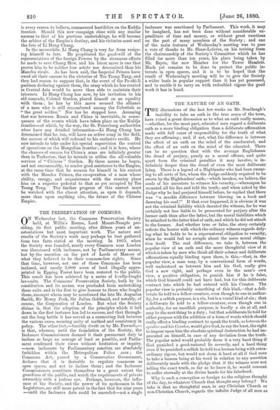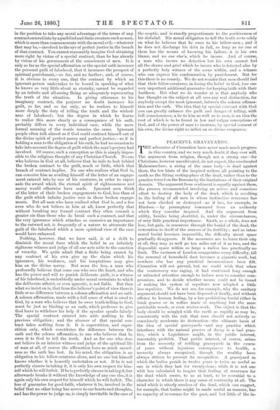THE NATURE OF AN OATH.
THE discussions of the last few weeks on Mr. Bradlaugh's inability to take an oath in the true sense of the term, have rased a great discussion as to what an oath really means, —whether, for the most part, educated men regard a deliberate oath as a more binding obligation than a deliberate affirmation made with full sense of responsibility for the truth of what they are affirming; and, if not, what the difference is between the effect of an oath on the mind of the uneducated, and the effect of an oath on the mind of the educated. There can be no question that with the average Englishman the dread of perjury, purely as a moral offence, and quite apart from the criminal penalties it may involve, is in- definitely deeper than the dread of even the most deliberate lying. There is a legend of a Highlander who had been swear- ing to all sorts of lies, whom the Judge suddenly required to be sworn by the Highlanders' oath,—which invokes, we believe, the souls of his ancestors to witness his veracity,—whereupon he recanted all his lies and told the truth ; and when asked by the Judge why he had perjured himself before, he replied that there was "a muckle difference between blaming on a book and damning his soul !" If that ever happened, it is obvious it was not the criminal liability which daunted the witness, for he was certainly not less liable to be prosecuted for perjury after the former oath than after the latter, but the moral liabilities which he attached to the latter kind of oath, and which he did not attach to the former. And whether true or false, the story certainly reflects the horror with which the ordinary witness regards defy- ing what he holds to be a supernatural obligation to veracity, when he would feel no scruple about the mere moral obliga- tion itself. The real difference, we take it, between the popular view of an oath and the more thoughtful view of it which is taken by men who think all their solemn and deliberate affirmations equally binding upon them, is this,—that, in the popular view, a man may, by a conventional form of words, well understood as between him and his God, really give God a new right, and perhaps even in the man's own view, a positive obligation, to punish him if he is false, which God himself could not have had, but for this deliberate contract into which he had entered with his Creator. The popular view is probably something of this kind,—that a deli- berate lie told to a fellow-creature, even though to one in author- ity, for a selfish purpose, is a sin, but is a venial kind of sin ; that a deliberate lie told to a fellow-creature, even though one in authority, for an unselfish purpose, is hardly a sin at all, and may be the next thing to a duty; but that a deliberate lie told for either purpose with the addition of a form of words which should really effect a binding contract to speak the truth, as between the speaker and his Creator, would give God, to say the least, the right to impose upon him the absolute spiritual destruction he had im- precated on himself, in case of any deviation from the truth. The popular mind would probably deem it a very hard thing if God punished a good-natured lie severely, and a hard thing even if he punished a selfish lie told to a human being with extra- ordinary rigour, but would not deem it hard at all if God were to take a human being at his word in relation to any assertion deliberately made with the pledge that if the witness were not telling the exact truth, so far as he knew it, he would consent to suffer eternally at the divine hands for his falsehood.
Why is such a conception so foreign to the religions thought of the day, to whatever Church that thought may belong P We take it that no thoughtful man, in any Christian Church or non-Christian Church, regards the infinite Judge of all men as in the position to take any moral advantage of the terms of any contract entered into by a purblind and finite creature such as man, which is more than commensurate with the moral evil,—whatever that may be,—involved to the eye of perfect justice in the breach of that contract. You cannot reasonably imagine God obtaining more right by virtue of a special contract, than he has already by virtue of his government of the consciences of men. It is only so far as the special affirmation or the special oath increases the personal guilt of falsehood, that it increases the prospect of spiritual punishment,—so far, and no farther ; and, of course, it is obvious to every one, that the contract by which an ignorant person undertakes to be bound in speaking of what he knows so very little about as eternity, cannot be regarded by an infinite and all-seeing Being as adequately representing the truth of the situation. In giving utterance to his imaginary contract, the perjurer no doubt increases his guilt, so far, and so far only, as he realises to himself more deeply the duty of telling the truth and the wicked- ness of falsehood; but the degree in which he learns to realise this more clearly as a consequence of his oath, probably differs in every individual case, while the mere formal meaning of the words remains the same. Ignorant people often talk almost as if God could contract himself out of the divine spirit of perfect mercy and perfect justice,—as if in holding a man to the obligation of his oath, he had no occasion to take into account the degree of guilt which the man's perjury had involved. Of course, such a conception as this is simply impos- sible to the religious thought of any Christian Church. No one who believes in God at all, believes that he fails to look behind the broken contract to the guilt, much or little, which that breach of contract implies. No one who realises what God is, can conceive him as availing himself of the letter of an engage- ment entered into. by one of his creatures, in order to super- sede the award which the eternal spirit of righteousness and mercy would otherwise have made. Ignorant men think of the letter of their - broken engagements to God, less than of the guilt which infinite justice sees in those broken engage- ments. But all men who have realised what God is, and a few even who do not believe in him at all, know perfectly that without breaking any formal contract they often commit a greater sin than those who do break such a contract, and that the very ignorance which attaches so excessive an importance to the outward act, is frequently of a nature to attenuate the guilt of the falsehood which a more spiritual view of the case would have enhanced.
Nothing, however, that we have said, is of a drift to diminish the moral force which the belief in an infinitely righteous witness and judge of all our acts adds to the sanction of veracity. We quite admit that a finite being cannot by any contract of his own give up the claim which his ignorance, his weakness, and his temptations may give him on the divine mercy. But none the less, a man who profoundly believes that some one who sees the heart, and who has the power and will to punish deliberate guilt, is a witness of his falsehood, is undoubtedly under moral restraints to which the deliberate atheist, or even agnostic, is not liable. But then what we insist on is, that from the believer's point of view there is little or no difference between a solemn affirmation and an oath. A solemn affirmation, made with a full sense of what is owed to God, by a man who believes that he owes truth-telling to God, must be just as binding as an oath, which professes to give God leave to withdraw his help if the speaker speaks falsely. The special contract entered into adds nothing to the previous obligation ; and the absence of that special con- tract takes nothing from it. It is superstition, and super- stition only, which constitutes the difference between the oath and the solemn affirmation, to one who believes that he owes it to God to tell the troth. And as for one who does not believe in an interior witness and judge of the spiritual life of man at all, of course the affirmation loses as much sacred- ness as the oath has lost. In his mind, the obligation is an obligation to his fellow-creatures alone, and no one but himself knows whether it is honestly undertaken or not. If he is not perfectly sincere in taking it, it is only his own respect for him- self which he will forfeit. If he is perfectly sincere in taking it, but afterwards breaks it without the knowledge of any one else, it is again only his own respect for himself which he will forfeit. The loss of guarantee for good-faith, whatever it be, involved in the belief that no other being has access to our hearts and thoughts, and has the power to judge us, is simply inevitable in the case of
the sceptic, and is exactly proportionate to the positiveness of his disbelief: His moral obligation to tell the truth.rests solely on what he believes that he owes to his fellow-men ; and if he does not discharge his debt in fall, so long as no one of them has the means of knowing his failure, it is his own blame, and no one else's, which he incurs. And of course, a man who incurs no detection but his own cannot feel all the shame and grief which he incurs who is detected also by a perfectly holy witness of the scene within, and a witness who can express his condemnation by punishment. But for this there is no remedy. We do not wonder that men should feel that their fellow-creatures, in losing the belief in God, lose one very important additional guarantee for keeping faith with their brethren. But what we do wonder at is that anybody who has thought on the subject at all sees any real distinction, for anybody except the most ignorant, between the solemn affirma- tion and the oath. The idea that by special contract with God you can greatly enhance the guilt and danger of telling, with full consciousness, a lie to him as well as to men, is an idea the root of which is to be found in low and vulgar conceptions of God, and of the power of man to increase, by special consent of his own, the divine right to inflict on us divine vengeance.



































 Previous page
Previous page